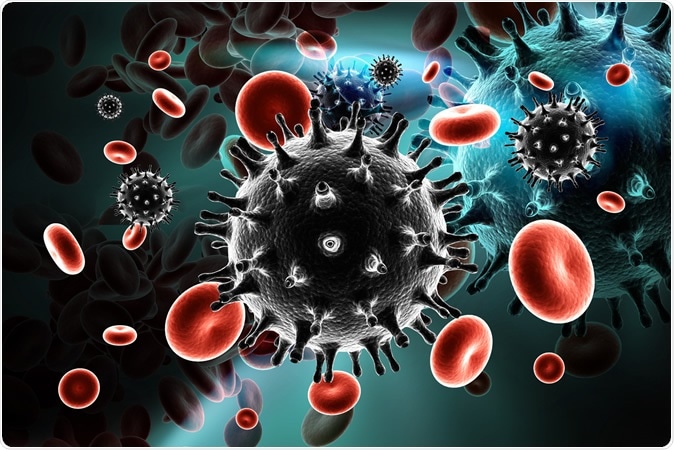The Human Immunodeficiency Virus (HIV) is a highly contagious infection usually transmitted through body fluids during sexual contact, blood transfusion, during pregnancy, delivery, and breastfeeding through breast milk. Worldwide, there were about 37.9 million people across the globe with HIV in 2018, and approximately 1.7 million people became newly infected across the globe in 2018 alone.

Digital illustration of HIV Virus in Blood Stream. Image Credit: RAJ CREATIONZS
That is not the case in the U.K., a new report shows that HIV new infections among gay and bisexual men dropped by 71 percent, from about 2,800 infections in 2012 to 800 in 2018. In 2014, there are an estimated 7,000 gay, bisexual, and men who have sex (GBM) with men living with undiagnosed HIV infection and it plummeted to 3,600 in 2018.
The largest decline of new infections in gay and bisexual men was among those who were born and residing in the UK, white, and between 25 and 49 years old.
According to the report by Public Health England, after a sharp rise of new HIV infections in the UK in 2014, it has seen a rapid decline between 2014 and 2018, from a staggering 6,278 to 4,453. While the largest decline was among gay and bisexual men, people who got infected heterosexually also fell as much as 43 percent, from 3,400 in 2009 down to 1,940 in 2018.
The steepest declines were in London residents, in those aged 25 to 34 years, in persons of black African ethnicity and those born abroad. Nearly half of all adults diagnosed in 2018 who acquired HIV heterosexually were born in a country of high HIV prevalence.
The report is a strong indicator that the country is nearing its goal to eliminate HIV transmission by 2030.
“We are well on our way to reaching the goal of eliminating HIV transmission by 2030, with the rapid fall in HIV transmission continuing in 2018, and nearly all of those diagnosed receiving treatment that prevents onward transmission,” Dr. Noel Gill, Head of STIs and HIV at Public Health England, said.
“Testing is a key part of the UK’s success, if you have HIV you can benefit from life-saving treatments that also prevent further transmission of the virus. Certain groups of people are at higher HIV risk and are advised to have regular tests, including men and women who have had unprotected sex with new or casual partners from countries where HIV is common, who should test every year, and men who have sex with men,” he added.
HIV testing and PrEP
The sharp decline in new diagnoses of HIV in the UK can be attributed to the country’s efforts to reach its goal. In 2018, the UK continued to exceed UNAIDS targets. Out of the 103,800 people living with HIV, about 93 percent were diagnosed, 97 percent of those diagnosed are under treatment, and 97 percent of those under treatment are now virally suppressed.
Also, thanks to HIV testing as fewer people remain unaware they’re infected. The country aims to conduct widespread HIV testing to detect undiagnosed infection. More than 1.1 million attendees in all specialist sexual health services (SHS) were tested for HIV, which increased by 6 percent since 2017.
Among gay, bisexual, and men who have sex with men (GBM), a total of 127,633 were tested for HIV, which increased by 9 percent from the previous year.
Aside from the increased rate of HIV testing, the decline has been credited to the introduction of the pre-exposure prophylaxis (PrEP) pill, which is widely and freely available in Wales and Scotland to people at a high risk of HIV exposure.
By the last quarter of 2018, approximately 13,000 to 19,500 persons, across the UK, were under PrEP, a majority of whom receive the drug through a publicly funded trial or clinic, while others self-purchase the drug.
“Thanks to excellent NHS care, people living with HIV now get immediate access to highly effective treatments, meaning that they can expect to live long and healthy lives and be confident they won’t pass the virus to their partners,” Dr. Michael Brady, National Adviser for LGBT Health to the NHS, said.
“The NHS is determined to carry on the significant progress towards eliminating HIV and achieving zero new transmissions by 2030, as part of our Long-Term Plan to improve the prevention of avoidable illnesses and tackle health inequalities,” he added.